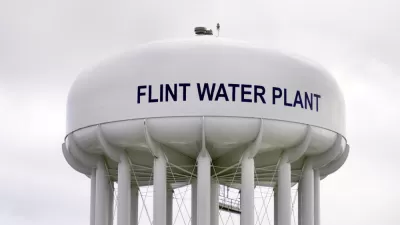A crisis that stretches back for several months escalated this week, bringing this news of the very bad variety to national attention.
Yanang Wang reports that Flint Mayor Karen Weaver declared a state of emergency in an ongoing crisis over the city's water supply. In Weaver's own, official words from the statement declaring the emergency on Monday: "The City of Flint has experienced a Manmade disaster."
Wang provides some background on the genesis of the crisis:
"The Hurley Medical Center, in Flint, released a study in September that confirmed what many Flint parents had feared for over a year: The proportion of infants and children with above-average levels of lead in their blood has nearly doubled since the city switched from the Detroit water system to using the Flint River as its water source, in 2014."
Wang reports that the statement also stated that the city is "seeking support from the federal government to deal with the 'irreversible' effects of lead exposure on the city’s children." That federal support, according to the statement, will likely be needed in the form of "greater need for special education and mental health services, as well as developments in the juvenile justice system."
Writing for Vox, Libby Nelson provides an explainer of the crisis. John Wisely and Robin Erb reported on the emerging crisis in October for the Detroit Free Press.
FULL STORY: In Flint, Mich., there’s so much lead in children’s blood that a state of emergency is declared

Planetizen Federal Action Tracker
A weekly monitor of how Trump’s orders and actions are impacting planners and planning in America.

Restaurant Patios Were a Pandemic Win — Why Were They so Hard to Keep?
Social distancing requirements and changes in travel patterns prompted cities to pilot new uses for street and sidewalk space. Then it got complicated.

Map: Where Senate Republicans Want to Sell Your Public Lands
For public land advocates, the Senate Republicans’ proposal to sell millions of acres of public land in the West is “the biggest fight of their careers.”

Maui's Vacation Rental Debate Turns Ugly
Verbal attacks, misinformation campaigns and fistfights plague a high-stakes debate to convert thousands of vacation rentals into long-term housing.

San Francisco Suspends Traffic Calming Amidst Record Deaths
Citing “a challenging fiscal landscape,” the city will cease the program on the heels of 42 traffic deaths, including 24 pedestrians.

California Homeless Arrests, Citations Spike After Ruling
An investigation reveals that anti-homeless actions increased up to 500% after Grants Pass v. Johnson — even in cities claiming no policy change.
Urban Design for Planners 1: Software Tools
This six-course series explores essential urban design concepts using open source software and equips planners with the tools they need to participate fully in the urban design process.
Planning for Universal Design
Learn the tools for implementing Universal Design in planning regulations.
Heyer Gruel & Associates PA
JM Goldson LLC
Custer County Colorado
City of Camden Redevelopment Agency
City of Astoria
Transportation Research & Education Center (TREC) at Portland State University
Camden Redevelopment Agency
City of Claremont
Municipality of Princeton (NJ)



























